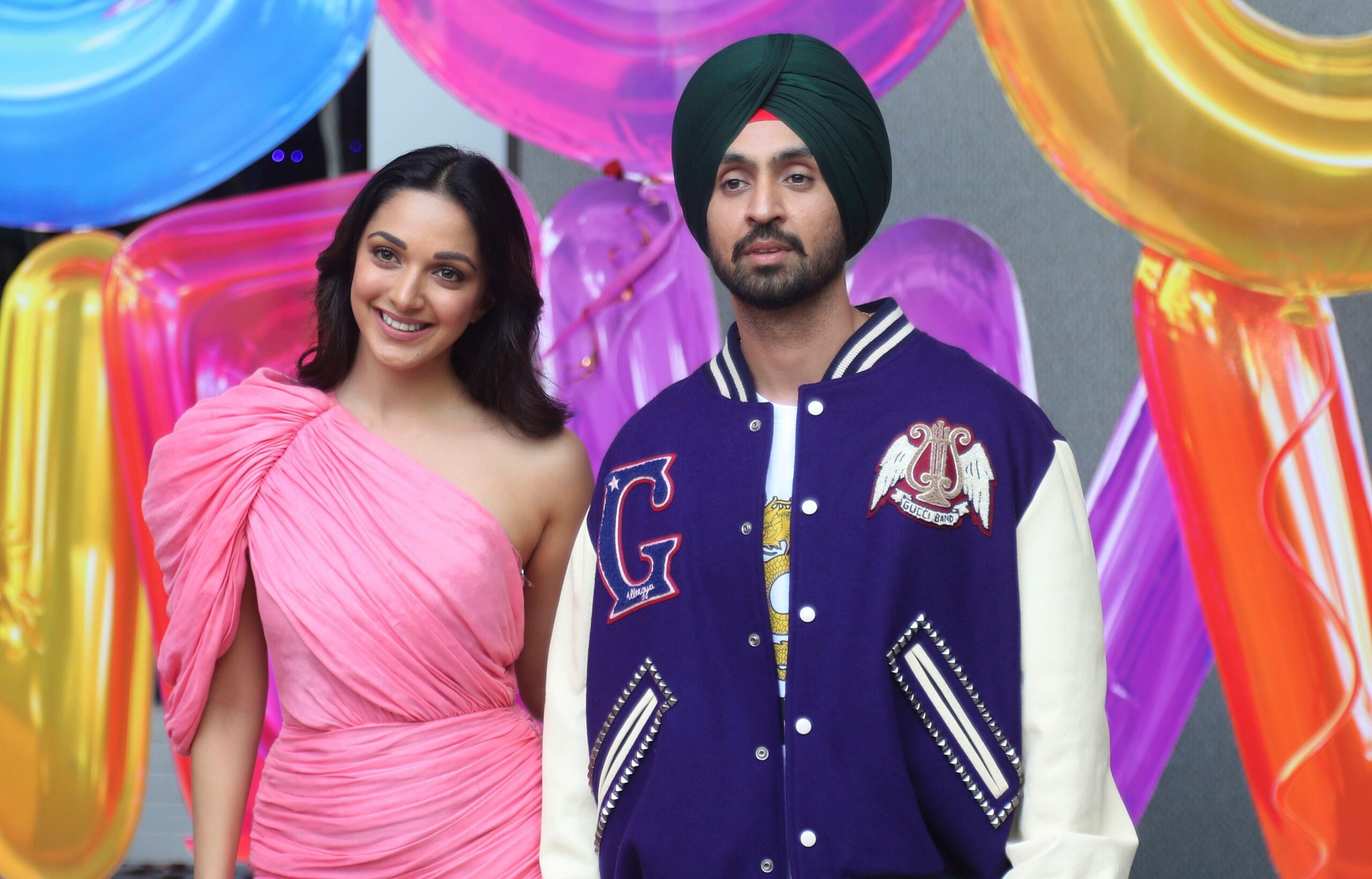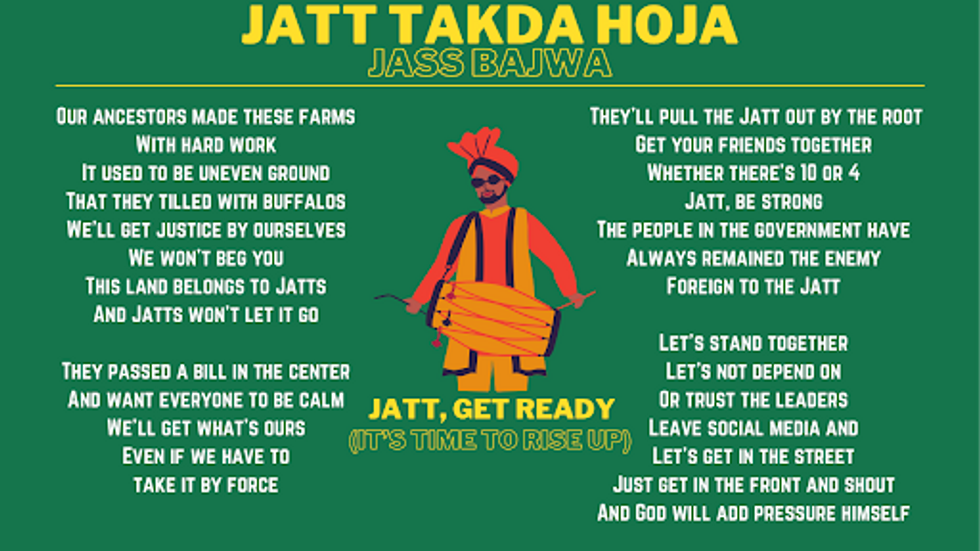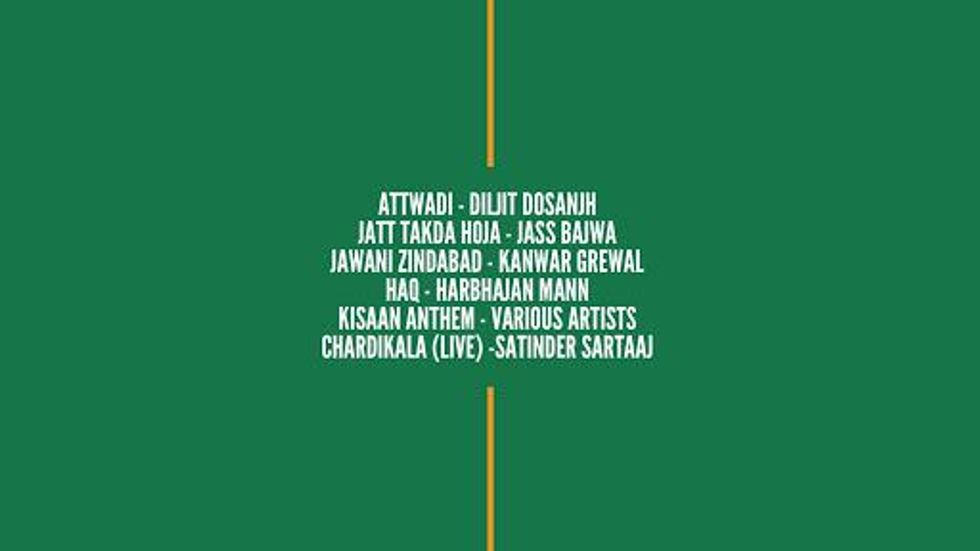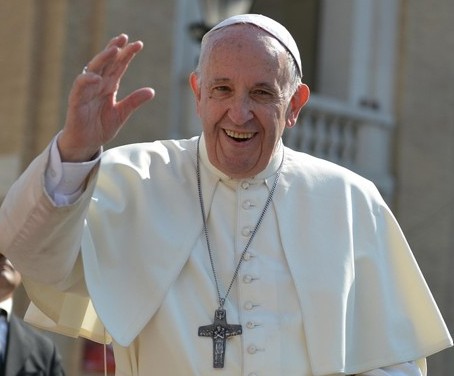
Punjabi Singer Diljit Dosanjh sits with fellow singers and protesters at New Delhi's border.
Rafiq Maqbool/AP/Shutterstock
In 2020, India’s grassroots agricultural movement blossomed to become the largest protest in human history — and it’s still going on.
Singhs And Singers: Support The Punjabi Singers Taking It To The Streetswww.youtube.com
After three agricultural laws were passed in September, small farmers’ movements began popping up primarily in Punjab, the heart of Indian agriculture and its fight for social justice. After two months without success, farmers’ unions from the northwestern neighboring states of Punjab, Haryana, and Rajasthan banded together and said, “Dilli Chalo” (“Let’s go to Delhi”).
Once an estimated 300,000 farmers showed up at the capital’s doorstops and blocked all four entryways into the city, the world took notice and listened to what these farmers had to say.
India’s huge farmer protests, explainedyoutu.be
All they were asking for was a repeal of laws that farmers, economists, and sociologists agree will hurt India’s small-scale farmers and help corporations amass wealth at the expense of said farmers. A capitalist’s free-market dream, India’s agricultural laws deregulate the market and remove the Minimum Support Price (MSP), which is a minimum price the Indian government will pay for crops. Forced to compete with powerful multinational corporations, small-scale farmers won’t be able to compete with the low prices of mass produce.
This is actually happening to American farmers as we speak. According to Iris Kim from Business Insider, during the Trump administration’s response to COVID-19, “government assistance has gone almost exclusively to corporations” while “small farmers who rely on direct-to-consumer sales have been shut out of receiving government subsidies.”
This is after a lengthy history of the American government disenfranchising Black farmers: Kim writes that “during the 20th century, Black farmers lost over 90% of their farmland to policies that consolidated land and subsidized corporate agribusinesses.”
If India’s new laws remain, the result would be a monopolized market, significantly less local produce, and millions of ruined livelihoods. Farmers forced to sell their goods for exorbitant prices would watch as their crops rotted away, their acres of land and decades of farming knowledge rendered useless. That is what Indian Congress foisted upon Indian farmers in September without voter approval, a disgrace in a land that asserts itself as the “world’s largest democracy.”
Aside from the inevitable impovershment of India’s farmers, there is a risk that India’s farmer suicide crisis will only worsen, as farmers can no longer feed their families and kill themselves for a government pension for their families. Since 1995, around 300,000 Indian farmers have committed suicide.
Yes, that is how broken Indian agriculture is: Farmers drink the pesticides that have been slowly killing their communities and livelihoods since the Green Revolution.
After seeing the full weight of what Indian farmers are dealing with, the fact that they’re rising up by the thousands is both an inspiration and a call to action the world over. And it’s no coincidence that the center of the movement is in Punjab, a land that has been so often confronted with conflict that the justice-oriented religion Sikhism was born out of this region.
Justice Warriors: How Sikhs Continue The Fight For South Asian Equitywww.youtube.com
Proving time and time again that they are a freedom-minded force to be reckoned with, Punjabi Sikhs have banded alongside farmers from different states and religions to send a message: Kisan Madzoor Ekta Zindabad, or “Long Live The Unity Between Farmers And Laborers”. And while one U.K. man was fined £10,000 for organizing a car rally in October, there are other ways that global citizens can support Punjabi farmers: by listening to the words of its modern-day poets.
Here are six Punjabi protest songs that are all about supporting farmers, preserving Punjabi culture, and uplifting a people that Mughal conquerors, British colonizers and even Indian presidents have tried to eradicate and silence.Attwadi by Diljit Dosanjh
The GOAT, the king — whatever you want to call him — Punjabi phenom Diljit Dosanjh has been a champion of the cause through social media, in person and through his song “Attwadi.”
Attwadi – Diljit Dosanjh ( Official song ) Karan Aujla || Mix Singh || New Punjabi songs 2020youtu.be
Months after the release of the aptly-named “G.O.A.T.”, Dosanjh released “Attwadi” to lend his voice to vocalizing the frustrations of Punjabi farmers spanning decades.
In Punjabi, attwadi means terrorist — an extreme choice for a song title, but it is only because protesting farmers have been falsely labeled as “terrorists” by Indian politicians and media. Much like the peaceful efforts of BLM protestors in the wake of George Floyd’s death, Indian protestors have been standing at the gates of New Delhi demanding change. And much like conservative politicians and detractors in the U.S., the nationalistic branch of Indian society labels anyone who critiques the government a “terrorist,” even when they are non-violent.
This taps into a deep history of labeling Punjabis as destructive separatists, a tradition that dates back to Punjabi freedom fighter Bhagat Singh. Singh, a dedicated martyr for the cause of Indian independence, has been labeled a terrorist in Indian history books long after Mohandas Gandhi refused time and again to pardon him. Singh embodies a sentiment many Sikh Punjabis feel: After sacrificing their lives to protect freedom and justice, fellow Indians label them as terrorists. This is exactly what Dosanjh says in his powerful chorus:
“The people whose dharam (way of life) we saved / the people whose country we saved from its enemies / call us terrorists when we ask for our rights.”
This refers to the centuries during which Sikhs fought to protect the beliefs of all Indians, no matter their religion or background. Dosanjh’s song calls out the hypocrisy of those who label these farmers terrorists while enjoying their crops in a song that discusses the journey millions have taken from Punjab to New Delhi to ask for justice.
If you’re not familiar with Punjabi or culture’s political history, Dosanjh has a pleasantly poppy discography to explore. Check out the lovely melancholic ballad that is PEED (the Punjabi word for “pain,” which is pronounced more like peerdh) or the English-infused lovelorn “Do You Know?”
PEED Lyrics English Translation Diljit Dosanjh | G.O.A.T.www.youtube.com
Do You Know – Diljit Dosanjh – Lyrics And English Translationwww.youtube.com
Jatta Tadka Hoja by Jass Bajwa
A passionate advocate for farmers’ rights, Punjabi singer Jass Bajwa has made multiple songs on this list. “Jatt Takda Hoja” is a call to action for Jatt farmers as they fight to till the land they’ve inhabited for centuries.
Jatta Takda Hoja : Jass Bajwa | G Skillz | Pavitar Bal | Latest Punjabi Songs 2020 | Being Digitalyoutu.be
Jatts are a prevalent Punjabi ethnic group that identifies with being agricultural land-owners. While Jatts are Hindu, Muslim, and Sikh, they were integral to the formation of Sikhism and are commonly identified in the context of Sikh Punjabi culture. In Bajwa’s song and in various Punjabi films, Jatt represents the pastoral Punjabi who is proud of their land and is always willing to fight for it.
Below is an English translation of “Jatta Takda Hoja.”
Kisaan Anthem by Various Artists
The second of Bajwa’s contributions, “Kisaan Anthem” features ten powerful Punjabi artists as they speak truth to power in the realities of state-to-nation relations.
Kisaan Anthem | Mankirt| Nishawn| Jass | Jordan| Fazilpuria| Dilpreet| Flow| Shree| Afsana|Bobby|Skywww.youtube.com
In this collaboration, Bajwa claims that “the Indian media has been sold” because major Indian television outlets have openly endorsed a pro-Modi/anti-farmer platform. In a hilarious turn of phrase, protestors are now referring to major media as “Godi Media,” godi being the Hindi word for “lap” that conveniently rhymes with Modi.
Perhaps the most striking performance is by Afsana Khan, who boldly calls out the men in her community to go to Delhi and fight for the cause.
“Boys of the village, what are you looking at now? Go to Delhi /Don’t somehow end up sleeping through it / Punjab is dying in Delhi.”
Like Dosanjh, Khan points out that the protestors are being called terrorists, asserting that if they were truly terrorists, the city would be overwhelmed: “The ones you’re calling terrorist, Delhi / if they have to become terrorists / you won’t be able to handle them.”
It’s important to note that Khan is a Muslim Punjabi woman. Although Sikh Punjabi men have been frequently portrayed as being at the forefront of these protests, there are Hindu and Muslim Punjabis marching with the same interests. Among the millions opposing India’s agricultural laws are Hindus, Muslims, Sikhs, and a variety of other religions from virtually all of India’s states, making this a unifying issue that transcends ethnic identity in a region so often divided by it.
Jawani Zindabad by Kanwar Grewal
Punjabi folk singer Kanwer Grewal teamed up with singer/songwriter Harf Cheema for “Jawani Zindabad” and “Pecha.”
Jawani Zindabad [Official Video] Kanwar Grewal | Harf Cheema| Latest Punjabi Songs 2020| Rubai Musicwww.youtube.com
Jawani zindabad translates to “long live the youth,” with Grewal and Cheema appreciating the young Punjabis who understand Punjab’s history of oppression and are participating in the farmers’ protests.
Anyone under the age of 35 doesn’t remember India’s 1984 Sikh genocide, a time when the Indian government attacked the Golden Temple and sanctioned brutal ethnic killings. This younger generation has never seen anything like the widespread upheaval that took place at that time, so for generations young and old to band together is a powerful occurrence happening at Delhi’s borders. The chorus of “Jawani Zindabad” can be translated to this:
“Today, the young have woken up / Today, in every village, a storm woke up / Now all of Punjab depends on you / Victory belongs to the young.”
Released in late November, Pecha opens with a poetic personification of Punjab.
Pecha {Official Video} | Kanwar Grewal | Harf Cheema |Latest Punjabi Songs 2020 | Rubai Music |youtu.be
“Hey Punjab, Delhi has ill intentions / Delhi’s reach has arrived around your neck,” Grewal sings. He then poses a weighted question: “Why does the ruin of your future and happiness make Delhi applaud?”
Haq by Harbajan Mann
Despite the usefulness of the term, haq is an Urdu/Punjabi word that lacks a direct English translation. As it’s used in nearly every song on this list, it’s worth exploring one of three ways haq has been defined during the farmers’ protests.
Haq could mean any of the following:
-An abstract idea of that which is due to a person or governmental body by law or tradition or nature
-That which is deserved or owed
-An assertion of a right (as to money or property)
In folk singer Harbajan Mann’s case, the first definition is what Mann refers to as the haq Punjabi farmers are owed by the Indian government (in this case, it’s the righteous treatment of farmers).
“Now we won’t go back or leave without taking what’s ours (haq).”
Haq (Official Video) | Harbhajan Mann | Music Empire | Harwinder Tatla | Latest Punjabi Songs 2020youtu.be
Chardikala by Satinder Sartaaj
Unlike the other songs that were carefully composed in studios, this is a recording of international actor/singer Satinder Sartaaj crooning at a protest rally at the Singhu Border on December 3rd. Sartaaj spoke from the soul about the Sikh concept of Chardi Kala.
ਆਹ ਦੇਖ ਕਲਾਵਾਂ ਚੜ੍ਹਦੀਆਂ ਨੇ | Satinder Sartaaj | Chardikla | Unrecorded Song | Whatsapp status lyrics.youtu.be
Loosely translated as “relentless optimism,” Chardi Kala is living in a positive, buoyant, and blissful mental state throughout life. It is something Sikhs repeat to one another as a way of coping with life’s hardships: Remain blissful and uplifted, for Waheguru (God) provides divine justice.
For further context on how Sikhs embrace Chardi Kala, this beautiful tribute by Valarie Kaur chronicles how a paralyzed elderly survivor of the 2012 Oak Creek Massacre, Baba Punjab Singh, lived in Chardi Kala until his dying breath.
In Sartaaj’s impromptu performance, he tells an energized crowd to have Chardi Kala in this tumultuous time, an uplifting note to carry in dark times.
















